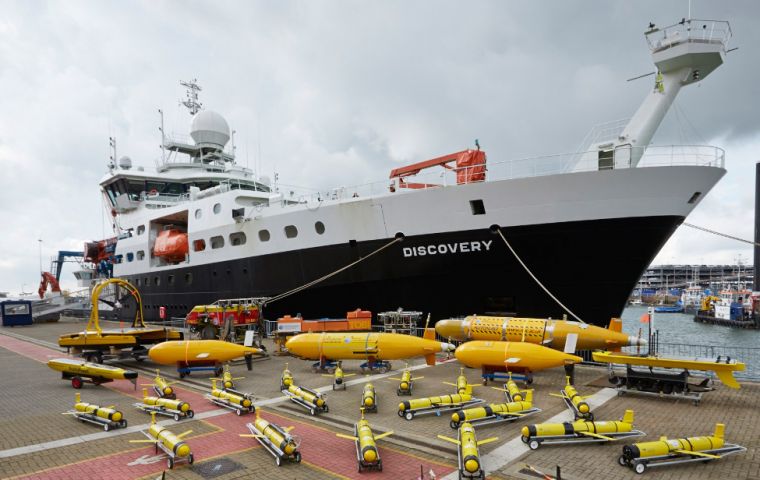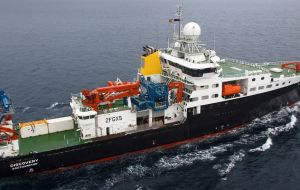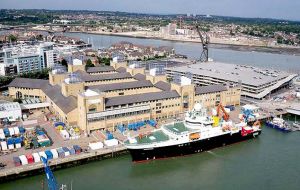MercoPress. South Atlantic News Agency
Eastern Falkland Plateau to be surveyed by state of the art scientific research vessel
 The RRS Discovery was designed by A.S. Skipsteknisk and was delivered to the National Oceanography Centre on 8 July 2013. (Pic NOC)
The RRS Discovery was designed by A.S. Skipsteknisk and was delivered to the National Oceanography Centre on 8 July 2013. (Pic NOC)  She is fitted with the most up-to-date and high-tech instruments and equipment, it is ideal for oceanic exploration.
She is fitted with the most up-to-date and high-tech instruments and equipment, it is ideal for oceanic exploration.  The National Oceanographic Center (NOC) is UK’s centre of excellence for oceanographic sciences and one of the top 3 oceanographic institutions in the world
The National Oceanographic Center (NOC) is UK’s centre of excellence for oceanographic sciences and one of the top 3 oceanographic institutions in the world  UK's Ambassador, Fiona Clouder, Captain Antonio Gatti and ship’s crew will be hosting a visit by students from the University of Magallanes (Pic PrensaAntartica.com)
UK's Ambassador, Fiona Clouder, Captain Antonio Gatti and ship’s crew will be hosting a visit by students from the University of Magallanes (Pic PrensaAntartica.com) The RRS Discovery arrived on Tuesday in Chile's extreme south port of Punta Arenas in advance of her next research expedition, to undertake seismic survey and piston coring operations in the eastern Falkland Plateau region of the Sub-Antarctic Southwest Atlantic Ocean.
The expedition is part of the UK-International Ocean Discovery Program, an international marine research collaboration dedicated to advancing scientific understanding of the Earth through drilling, coring, and monitoring the sub-seafloor.
While in port, British Ambassador in Chile, Fiona Clouder, ship’s Captain, Antonio Gatti and other representatives from the National Oceanography Centre, the British Antarctic Survey and the University of Southampton, are hosting a reception for representatives from local government and the marine sector in Chile. Guests will tour the ship and have opportunity to network about science links between Chile and UK scientists.
On 10 January, Her Majesty’s Ambassador, Fiona Clouder, ship’s Captain, Antonio Gatti and ship’s crew are hosting a visit by students from the University of Magallanes, to give the young scientists of the future, the chance to learn about how research is conducted at sea
The RRS Discovery was designed by A.S. Skipsteknisk and was delivered to the National Oceanography Centre on 8 July 2013. Fitted with the most up-to-date and high-tech instruments and equipment, it is ideal for oceanic exploration.
The National Oceanographic Center (NOC) is UK’s centre of excellence for oceanographic sciences and one of the top 3 oceanographic institutions in the world. It is renowned for its ability to invent cutting-edge technology and to carry out world leading science on a global scale.
With the ability to travel to remote and extreme oceanic environments, RRS Discovery is highly sophisticated and has the ability to operate in high sea states. The ship comes with sub-bottom profiling and multi-beam equipment for mapping the seabed, while her dynamic positioning capability means that Remotely Operated Vehicles can be used. Her wide range of cranes and over-side gantries, with associated winches and wires, will allow many different types of equipment to be deployed from the ship.
Centenary of the Discovery Committee UK has the longest track record of undertaking marine scientific research in the world and is also a pioneer in marine science and exploration. As part of this legacy, this year we celebrate the centenary of the Discovery Committee, which was created by the UK government to carry out scientific investigations in the world’s southern regions.
The RRS Discovery is the fourth research vessel with this name. The first Discovery ship was designed for Antarctic research and was launched as a Royal Research Ship (RRS) in 1901. Its first mission was the British National Antarctic Expedition, carrying Robert Falcon Scott and Ernest Shackleton on their first, successful journey to the Antarctic, known as the Discovery Expedition.
British scientists in Punta Arenas Four world-class British scientists are also in Punta Arenas, prior to a visit to Rothera station in Antarctica. They are: Dr Rob Larter, British Antarctic Survey:
Robert Larter is a Marine geophysicist who has been working at the British Antarctic Survey since 1987. His main research focus since 2004 has been on late Quaternary ice sheet history, glacial geomorphology and glacial/glacial-marine processes. He has also been involved in research on tectonic and palaeo-environmental history of Antarctica and the Southern Ocean through the Cenozoic era. He is an expert in the processing and interpretation of seismic reflection, marine magnetic, swath bathymetry and side-scan sonar data. Scope of theoretical knowledge and coding experience includes forward and inverse seismic modeling and tectonic plate fitting/rotation calculations.
Kevin Forshaw, Associate Director, Innovation and Enterprise, National Oceanography Centre
Kevin has been engaged in supporting the Marine and Maritime sector for over 15 years, acting as the interface between universities, research organizations and industry. Kevin has established numerous collaborative research projects focused on vessel efficiency, and now increasingly Marine Autonomous Systems.
Dr Steven Bohaty, Associate Professor in Stratigraphy and Palaeoceanography, University of Southampton
Dr Steven Bohaty’s is an Associate Professor within Ocean and Earth Science, National Oceanography Centre Southampton at the University of Southampton. He is a lecturer at the Southampton Marine and Maritime Institute, University of Southampton (2013-2016), and postdoctoral researcher at the University of Southampton.
Dr Claus-Dieter Hillenbrand, British Antarctic Survey
Dr Hillenbrand is a marine geologist and sedimentologist, who is interested in glacial and glaciomarine depositional processes and ice-sheet reconstructions. His research during the last 20 years was the sedimentological study of Late Miocene to Holocene glacial and marine sediments from the West Antarctic continental shelf, slope and rise. Dr Hillenbrand has considerable expertise in analyzing, dating, and interpreting marine sediment cores and participated in fourteen marine geological and geophysical cruises to Antarctica and the Southern Ocean on RRS James Clark Ross, RV Polarstern and RV Sonne.




Top Comments
Disclaimer & comment rules-

-

Read all commentsEngland will return the Malvinas within 25 years.
Jan 13th, 2018 - 04:50 am 0England will return the Malvinas within 25 years.
Jan 17th, 2018 - 05:01 am 0Commenting for this story is now closed.
If you have a Facebook account, become a fan and comment on our Facebook Page!